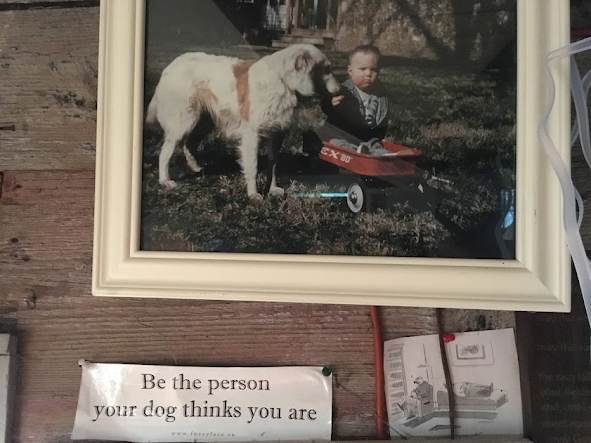LISTEN. We teachers these days can't avoid noticing how many of our young students are self-diagnosing as anxious, displaced from a consistent core identity, and pessimistic about their prospects in life.
Young adulthood has always been a challenging time of life, but things seem different now. It's become commonplace to identify the Internet and social media as the locus of difference driving young angst. I guess that'll do, in the absence of more directly-life-threatening sources of distress (like, say, a Russian invasion or a war of extermination).
Jonathan Haidt has a book coming soon, The Anxious Generation: How the Great Rewiring of Childhood Is Causing an Epidemic of Mental Illness.
I'm scheduled to deliver an MTSU Honors lecture later this semester in their series Mental Health and the Good Life: Strategies for Happiness, Wholeness, Wellbeing. I'm personally and philosophically motivated to understand and do what I can to address this issue.
I've been discussing it with a friend, who proposes a form of therapeutic intervention involving film studies and the Shakespearian premise from As You Like It (which we'll be taking up later this semester in Susan Neiman's Why Grow Up) that "all the world's a stage, and all the men and women merely players..."
It's an intriguing proposal. Call it cine-behavioral therapy. Reminds me of Walker Percy’s Binx Bolling in The Moviegoer, a young man on a mission he calls The Search. “The search is what anyone would undertake if he were not sunk in the everydayness of his own life. To become aware of the search is to be onto something. Not to be onto something is to be in despair.”
Maybe we should register for Socratic shrink Lou Marinoff’s counseling seminar and get ourselves certified. Hang out a shingle. It might be self-therapeutic, if not more broadly ameliorative (or remunerative).
I do wonder, though, if it’s ultimately constructive to encourage a young person who’s already feeling disaffected and detached to take a step further into the gallery and view herself as merely a player on a stage, a character in her own drama.
Walker Percy again: in Love in the Ruins: The Adventures of a Bad Catholic at a Time Near the End of the World he wrote about a troubled biologist with an identity crisis and a condition his lapsed Catholic “counselor” calls angelism (“excessive abstraction of the self from itself”). Deploying a tool he calls a “Qualitative Quantitative Ontological Lapsometer,” the doc prescribes a cure involving a long slog home through the swamp–in other words, a deeper immersion in the real world of physical exertion and resistance. The goal: “recovery of the self through ordeal.”
"He registered a dizzy 7.6 mmv over Brodmann 32, the area of abstractive activity. Since that time I have learned that a reading over 6 generally means that a person has so abstracted himself from himself and from the world around him, seeing things as theories and himself as a shadow, that he cannot, so to speak, reenter the lovely ordinary world. Instead he orbits the earth and himself. Such a person, and there are millions, is destined to haunt the human condition like the Flying Dutchman."
It could be that unhappy young people these days are feeling more ethereal and out of touch with reality because, well, they’re out of touch with reality. Too much in touch with electrons and virtual misrepresentations of reality. Too cut-off from from the “lovely ordinary world.” Orbital. In desperate need of William James’s “remedy” in
On a Certain Blindness in Human Beings, right after the passage in which he applauds Emerson’s unbidden “exhilaration” at merely being alive and “crossing a bare common”:
Life is always worth living, if one have such responsive sensibilities.
But we of the highly educated classes (so called) have most of us got
far, far away from Nature. We are trained to seek the choice, the rare,
the exquisite exclusively, and to overlook the common. We are stuffed
with abstract conceptions, and glib with verbalities and verbosities;
and in the culture of these higher functions the peculiar sources of joy
connected with our simpler functions often dry up, and we grow
stone-blind and insensible to life's more elementary and general goods
and joys.
The remedy under such conditions is to descend to a more profound and
primitive level…
So yes, there must be a version of the examined life that doesn’t descend into egocentric self-absorption and self-pity. A version that recovers what’s best in the experience of being a live human subject with goals and dreams. Ideally too, a version that doesn’t require therapeutic intervention involving serious risk of bodily harm.
When I hang out my shingle I’ll be framing my Marcus Aurelius morning mantra. It may not take, with many brooding anxiety-ridden youngsters, but they need to hear it:
“When you arise in the morning, think of what a precious privilege it is to be alive-to breathe, to think, to enjoy, to love.”
And: push away from the screen. Get out into the open air. Walk the dog. Go for a hike. Socialize with your friends in real time, in real places.
Get over yourself. Heed Eleanor Roosevelt: “You wouldn’t worry so much about what others think of you if you realized how seldom they do.”
I may not be cut out for counseling after all.
Solvitur ambulando may not be everyone’s cure. But isn’t it worth a try?





















